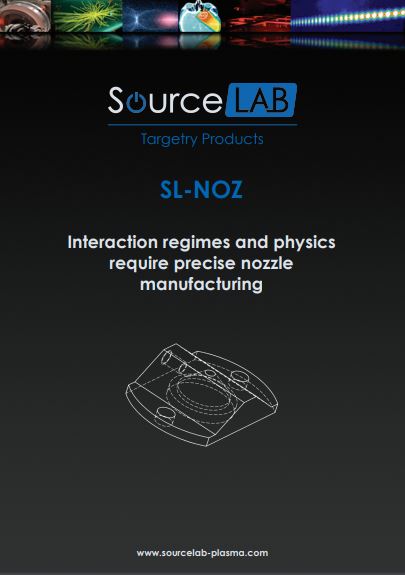TARGETRY
Unique capabilities for nozzle manufacturing
SourceLAB developed a range of solutions for nozzle manufacturing and characterization:
Flow simulation
- From a CAD file or specifications
Manufacturing
- Metal, ceramic, 3D printing
- Down to 30 µm hole with complex shapes
- SS manufacturing up to 58 HRC
Characterization
- Density profile
- Interferometry from Phasics
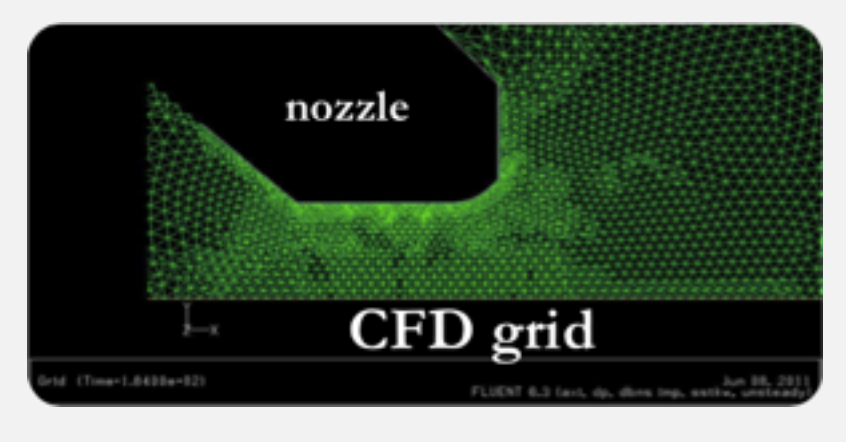
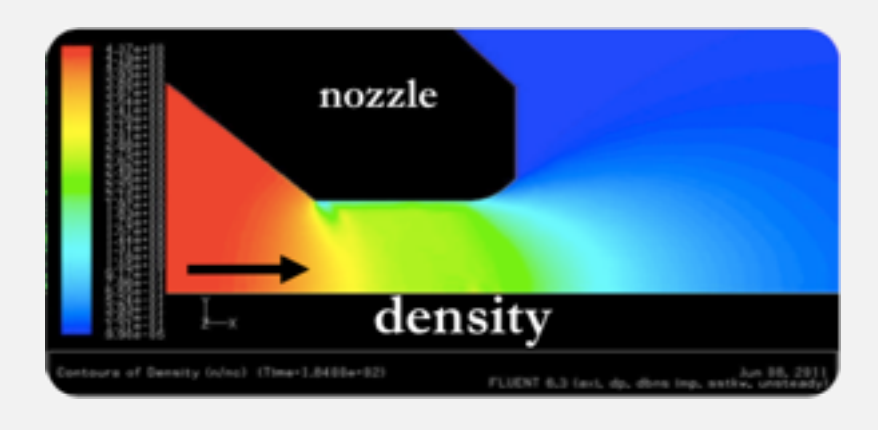

Examples of nozzles complex shapes manufacturing
Specific nozzles for interaction regimes
To make it possible for the experimentalist to explore precise interaction regimes and physics, SourceLAB developed a unique class of nozzles associated to precise manufacturing capabilities, that give access to specific plasma shapes and densities.
Each nozzle of the class can be easily fixed on a rapid valve to get the desired output flow.
In particular, our new class SL-Noz-Comp (see specifications), is specially designed to generate sub- 100 μm plasma of near-critical density, without external shocks from blades or cooling devices.
Importantly, it produces sub-μm dense plasmas at a larger distance from the nozzle exit than the standard 400 μm sonic nozzle. Therefore the lifetime of the nozzle is significantly increased while ensuring outstanding performances.
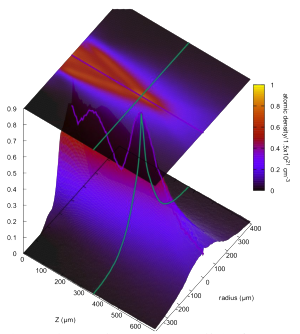
Corresponding atomic density map and projection measured at the exit.
The backing pressure reads 320 bar.
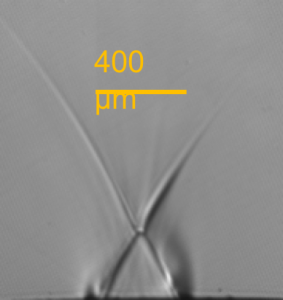
Shadowgram of a typical SL-Noz-Comp jet in vacuum.
Detailed specifications:
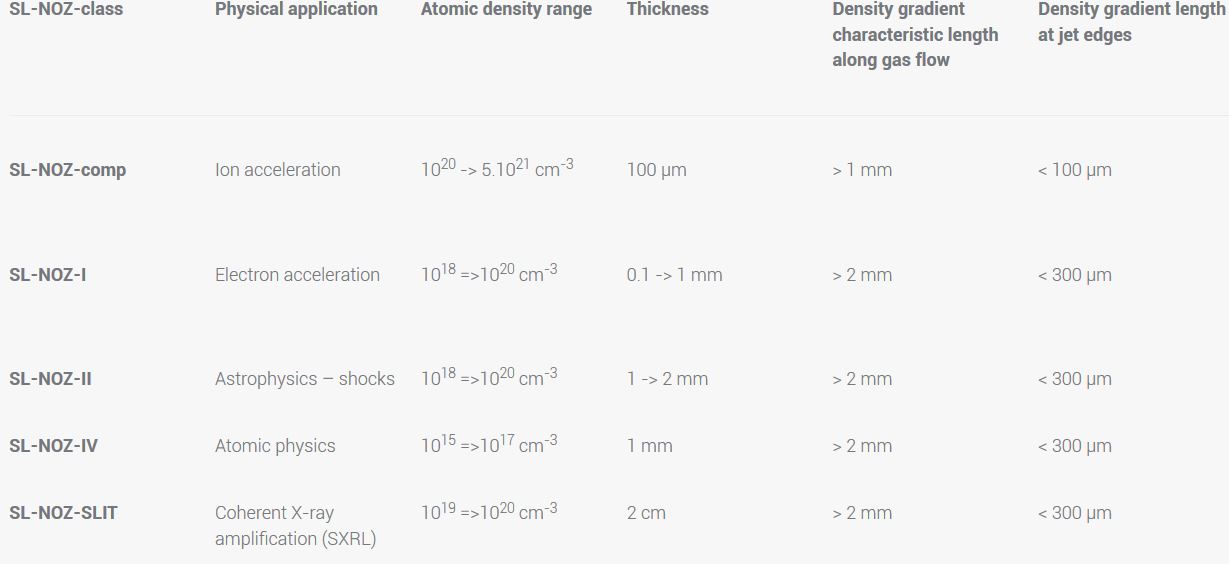
- L. Rovige et al.
Symmetric and asymmetric shocked gas jets for laser-plasma experiments
Rev. Sci. Inst., 92, 083302 (2021)
- J.Faure et al.
A review of recent progress on laser-plasma acceleration at kHz repetition rate
Plasma Phys. Control. Fusion 61 014012 (2019)
- D. Gustas et al.
High-charge relativistic electron bunches from a kHz laser-plasma accelerator
Phys. Rev. Accel. Beams 21, 013401 (2018)
- Overview
-
Unique capabilities for nozzle manufacturing
SourceLAB developed a range of solutions for nozzle manufacturing and characterization:
Flow simulation
- From a CAD file or specifications
Manufacturing
- Metal, ceramic, 3D printing
- Down to 30 µm hole with complex shapes
- SS manufacturing up to 58 HRC
Characterization
- Density profile
- Interferometry from Phasics



Examples of nozzles complex shapes manufacturing
Specific nozzles for interaction regimes
To make it possible for the experimentalist to explore precise interaction regimes and physics, SourceLAB developed a unique class of nozzles associated to precise manufacturing capabilities, that give access to specific plasma shapes and densities.
Each nozzle of the class can be easily fixed on a rapid valve to get the desired output flow.
In particular, our new class SL-Noz-Comp (see specifications), is specially designed to generate sub- 100 μm plasma of near-critical density, without external shocks from blades or cooling devices.
Importantly, it produces sub-μm dense plasmas at a larger distance from the nozzle exit than the standard 400 μm sonic nozzle. Therefore the lifetime of the nozzle is significantly increased while ensuring outstanding performances.

Corresponding atomic density map and projection measured at the exit.
The backing pressure reads 320 bar.
Shadowgram of a typical SL-Noz-Comp jet in vacuum.
- Specifications
-
Detailed specifications:

- Downloads
- Publications
-
- L. Rovige et al.
Symmetric and asymmetric shocked gas jets for laser-plasma experiments
Rev. Sci. Inst., 92, 083302 (2021)
- J.Faure et al.
A review of recent progress on laser-plasma acceleration at kHz repetition rate
Plasma Phys. Control. Fusion 61 014012 (2019)
- D. Gustas et al.
High-charge relativistic electron bunches from a kHz laser-plasma accelerator
Phys. Rev. Accel. Beams 21, 013401 (2018)
- L. Rovige et al.
Unique capabilities for nozzle manufacturing
SourceLAB developed a range of solutions for nozzle manufacturing and characterization:
Flow simulation
- From a CAD file or specifications
Manufacturing
- Metal, ceramic, 3D printing
- Down to 30 µm hole with complex shapes
- SS manufacturing up to 58 HRC
Characterization
- Density profile
- Interferometry from Phasics



Examples of nozzles complex shapes manufacturing
Specific nozzles for interaction regimes
To make it possible for the experimentalist to explore precise interaction regimes and physics, SourceLAB developed a unique class of nozzles associated to precise manufacturing capabilities, that give access to specific plasma shapes and densities.
Each nozzle of the class can be easily fixed on a rapid valve to get the desired output flow.
In particular, our new class SL-Noz-Comp (see specifications), is specially designed to generate sub- 100 μm plasma of near-critical density, without external shocks from blades or cooling devices.
Importantly, it produces sub-μm dense plasmas at a larger distance from the nozzle exit than the standard 400 μm sonic nozzle. Therefore the lifetime of the nozzle is significantly increased while ensuring outstanding performances.

Corresponding atomic density map and projection measured at the exit.
The backing pressure reads 320 bar.

Shadowgram of a typical SL-Noz-Comp jet in vacuum.
Detailed specifications:
SL-NOZ-class
Physical application
Atomic density range
Thickness
Density gradient characteristic length along gas flow
Density gradient length at jet edges
SL-NOZ-comp
Ion acceleration
1020 -> 5.1021 cm-3
100 μm
> 1 mm
< 100 μm
SL-NOZ-I
Electron acceleration
1018 =>1020 cm-3
0.1 -> 1 mm
> 2 mm
< 300 μm
SL-NOZ-II
Astrophysics – shocks
1018 =>1020 cm-3
1 -> 2 mm
> 2 mm
< 300 μm
SL-NOZ-IV
Atomic physics
1015 =>1017 cm-3
1 mm
> 2 mm
< 300 μm
SL-NOZ-SLIT
Coherent X-ray amplification (SXRL)
1019 =>1020 cm-3
2 cm
> 2 mm
< 300 μm
- I.Prencipe et al
Targets for high repetition rate laser facilities: needs, challenges and perspectives
High Power Laser Science and Engineering, 5, e17 (2017)
- E. Guillaume et al.
Physics of fully-loaded laser-plasma accelerators
Phys. Rev. ST Accel. Beams, Volume 18, 061301, June (2015)
- Overview
-
Unique capabilities for nozzle manufacturing
SourceLAB developed a range of solutions for nozzle manufacturing and characterization:
Flow simulation
- From a CAD file or specifications
Manufacturing
- Metal, ceramic, 3D printing
- Down to 30 µm hole with complex shapes
- SS manufacturing up to 58 HRC
Characterization
- Density profile
- Interferometry from Phasics



Examples of nozzles complex shapes manufacturing
Specific nozzles for interaction regimes
To make it possible for the experimentalist to explore precise interaction regimes and physics, SourceLAB developed a unique class of nozzles associated to precise manufacturing capabilities, that give access to specific plasma shapes and densities.
Each nozzle of the class can be easily fixed on a rapid valve to get the desired output flow.
In particular, our new class SL-Noz-Comp (see specifications), is specially designed to generate sub- 100 μm plasma of near-critical density, without external shocks from blades or cooling devices.
Importantly, it produces sub-μm dense plasmas at a larger distance from the nozzle exit than the standard 400 μm sonic nozzle. Therefore the lifetime of the nozzle is significantly increased while ensuring outstanding performances.

Corresponding atomic density map and projection measured at the exit.
The backing pressure reads 320 bar.
Shadowgram of a typical SL-Noz-Comp jet in vacuum.
- Specifications
-
Detailed specifications:
SL-NOZ-class
Physical application
Atomic density range
Thickness
Density gradient characteristic length along gas flow
Density gradient length at jet edges
SL-NOZ-comp
Ion acceleration
1020 -> 5.1021 cm-3
100 μm
> 1 mm
< 100 μm
SL-NOZ-I
Electron acceleration
1018 =>1020 cm-3
0.1 -> 1 mm
> 2 mm
< 300 μm
SL-NOZ-II
Astrophysics – shocks
1018 =>1020 cm-3
1 -> 2 mm
> 2 mm
< 300 μm
SL-NOZ-IV
Atomic physics
1015 =>1017 cm-3
1 mm
> 2 mm
< 300 μm
SL-NOZ-SLIT
Coherent X-ray amplification (SXRL)
1019 =>1020 cm-3
2 cm
> 2 mm
< 300 μm
- Downloads
-
- Publications
-
- I.Prencipe et al
Targets for high repetition rate laser facilities: needs, challenges and perspectives
High Power Laser Science and Engineering, 5, e17 (2017)
- E. Guillaume et al.
Physics of fully-loaded laser-plasma accelerators
Phys. Rev. ST Accel. Beams, Volume 18, 061301, June (2015)
- I.Prencipe et al
